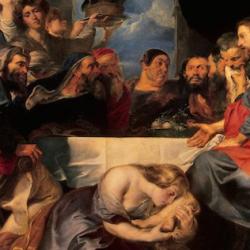In Luke 4, Jesus responds to the wonder and marveling of the crowd by saying that “no prophet is welcome in his home town” (v. 24). The comments, like the comments in v 23, seem to come out of left field. Why does Jesus say this? What’s he up to?
Verses 23-24 are responses to the question “Is this not Joseph’s son?” in v 22. The issue is Jesus’ paternity, an issue that has already been raised a couple of times in Luke. In 2:48-49, he responds to Mary’s complaint that “Your father ( pater ) and I have anxiously been looking for you” with “Did you not know that I had to be in the things of My Father ( pater ).” Jesus takes His cues not from Joseph but from His heavenly Father. Likewise, the genealogy in chapter 3 qualifies Joseph’s paternity (“as it was being thought the son of Joseph,” v 23) to emphasize that Jesus is in fact the son of God, Last Adam (v. 38).
Thus, when the people of Nazareth say that He is Joseph’s son, they are making the same mistake as Mary, and receive a similar response. They are saying that they have claims on Jesus since He is from their “fatherland” ( patria , 4:24). In response, Jesus radically qualifies His attachment to the “fatherland,” citing the prophetic examples of Elijah and Elisha to explain His mission to the announce good news to the “poor” (vv. 25-27).
Mary’s response to Jesus’ statement about His paternity is to ponder things in her heart, accepting her son’s rebuke and seeking to understand it all (2:51). The people of Nazareth, however, react with unbelief and rage at the idea that Joseph’s son, a hometown boy from Nazareth, should give His attention to Capernaum, not to mention Gentile widows and soldiers. It is too much, and they seek to kill Him. Eventually, they do kill Him, and on much the same grounds — that He is a traitor to His fatherland.















